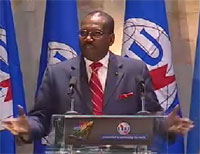 "...
Climate change is another profound challenge that is at work, transforming the
face of the world. Whatever the underlying cause, at current rates of
extinction, scientists predict that two-thirds of all bird, mammal, butterfly,
and plant species will be extinct by the end of this century. Not only the
species, but the very survival of the world we live in and the planet itself, is
now in jeopardy. Climate change is a global challenge that the world simply
cannot afford to lose — not just for our sake, but for the sake of our children. "...
Climate change is another profound challenge that is at work, transforming the
face of the world. Whatever the underlying cause, at current rates of
extinction, scientists predict that two-thirds of all bird, mammal, butterfly,
and plant species will be extinct by the end of this century. Not only the
species, but the very survival of the world we live in and the planet itself, is
now in jeopardy. Climate change is a global challenge that the world simply
cannot afford to lose — not just for our sake, but for the sake of our children.
ITU is mainstreaming this major issue into its regular work programme. ITU
is undertaking important work on how ICTs can help prevent and avert climate
change. There is a strong role for ITU in standards for energy efficiency of the
ICT equipment on which our digital economy depends. ITU has always taken the
lead in setting high standards for telecommunications and ICTs, and this is
another key area in which ITU can make a real difference.
The Resolution passed recently at the World Telecommunication
Standardization Assembly (WTSA) in Johannesburg encourages ITU Member States to
work towards reductions in Greenhouse Gas (GHG) emissions arising from the use
of ICTs, in line with the UN Framework Convention on Climate Change. ITU aims to
achieve climate neutrality for its operations within three years, and ITU is at
the forefront of this progress compared with many other international
organizations.
In the global effort to combat climate change, ITU is continuing to help
developing countries to mitigate the effects of climate change, including the
use of emergency telecommunications and alerting systems for disaster relief.
ITU, in collaboration with its membership, is identifying the necessary
radio-frequency spectrum for climate monitoring and disaster prediction,
detection and relief, including a promising cooperation with the World
Meteorological Organization (WMO) in the field of remote-sensing applications.
ITU will continue to join efforts in the context of the UN system, in
order to "deliver as one" with a principal focus on ICTs and climate change. In
2000, UN Members adopted the Millennium Declaration as a renewed commitment to
human development, including the eight Millennium Development Goals (MDGs).
However, climate change impacts will tend to offset progress being made to meet
the MDGs by 2015, so it is crucial to empower developing countries by
facilitating their access to the ICTs needed for climate change adaptation and
disaster risk reduction.
It is widely acknowledged that the issue of climate change is rapidly
emerging as a global concern, which needs a global response. The High-Level
Segment underlined that Member States are committed to combating climate change:
ITU remains committed to combating climate change. ITU’s work is in line with
the needs and priorities of our Member States in the vital importance of taking
action to combat climate change."
Dr Hamadoun I. Touré
ITU Secretary-General |



